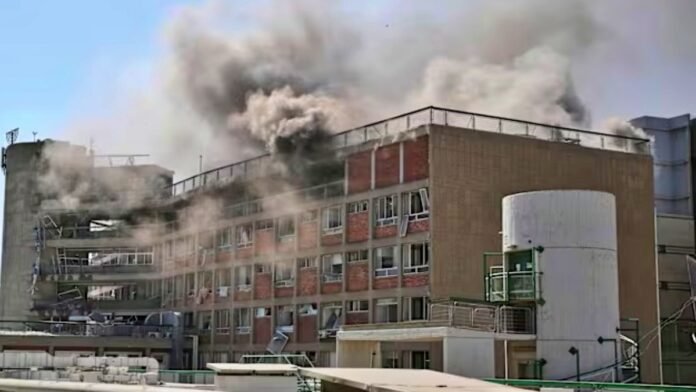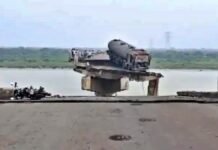
Key Points
- Iran launched a major missile barrage, directly striking Soroka Medical Center in Beersheba, Israel’s largest hospital in the south.
- The attack caused extensive damage; dozens were injured, but a mass casualty event was averted due to prior evacuation of the hardest-hit wards.
- Israeli officials and international observers have condemned the strike as a deliberate attack on civilians and a war crime.
- The missile strike is part of a spiraling conflict, with Israel simultaneously attacking Iran’s nuclear infrastructure.
- Videos and eyewitness accounts reveal scenes of panic, destruction, and emergency evacuations at the hospital.
- The hospital, serving nearly one million people, is now closed to all but life-threatening cases.
New Delhi: In a dramatic escalation of the ongoing Iran-Israel war, Iran launched a barrage of around 30 ballistic missiles early Thursday, one of which scored a direct hit on the Soroka Medical Center in Beersheba Israel’s largest hospital in the south. The strike caused extensive structural damage, shattered windows, and sent thick black smoke billowing from the facility.
Hospital officials reported that the old surgical ward, which took the brunt of the impact, had been evacuated just a day earlier, a move credited with preventing mass casualties. The hospital’s director general, Prof. Shlomi Kodesh, confirmed that all patients and staff were in fortified shelters at the time of the strike, and only minor injuries were reported among those present, mostly from blast shockwaves and debris.
Scenes of Chaos and Emergency Response
Eyewitness videos and social media footage show hospital staff and patients running through smoke-filled corridors, with glass and debris littering the floors. Volunteers and medical teams described ceilings collapsing, chaos in the wards, and a frantic rush to move everyone to protected areas.
Emergency services responded rapidly, and initial fears of hazardous material leaks were ruled out after inspection. The hospital has requested the public not to come for treatment except in life-threatening emergencies, as it assesses the full extent of the damage.
Widespread Damage Across Israel
The Soroka strike was part of a larger Iranian salvo that also hit residential buildings in Tel Aviv, Holon, and Ramat Gan, injuring at least 47 people across Israel, including several in serious condition. Sirens sounded throughout the country, sending civilians scrambling for bomb shelters.
International Condemnation and Accusations of War Crimes
Israeli Health Minister Uriel Buso and other top officials condemned the attack as a deliberate targeting of a civilian medical facility a war crime under international law. Israel’s deputy foreign minister called the strike “intentional” and “criminal,” emphasizing that Soroka is not a military installation but the main medical center for the entire Negev region.
Prime Minister Benjamin Netanyahu vowed to “extract a heavy price” from Iran, while rescue officials credited the hospital’s emergency protocols and evacuation drills for averting a far greater tragedy.
Context: Retaliation and Escalation
Iran stated the attack was retaliation for recent Israeli airstrikes, including a strike on a school in Tehran and, most recently, a major attack on Iran’s Arak heavy water nuclear reactor. The conflict, now in its seventh day, has seen both sides targeting critical infrastructure and civilian areas, with hundreds killed in Iran and at least 24 reported dead in Israel from the ongoing hostilities.
Israel’s missile defense systems have intercepted many incoming threats, but officials acknowledge that the sheer volume of attacks has allowed some missiles to breach defenses and strike high-value targets.
Human Impact and Ongoing Crisis
Soroka Medical Center, with over 1,000 beds and serving nearly 1 million residents, is a lifeline for southern Israel. The attack has left the hospital operating at minimal capacity, with many patients transferred to other facilities and emergency protocols in full effect.
As the war intensifies, the direct targeting of medical infrastructure marks a dangerous new phase, raising fears of further civilian casualties and international escalation.





































